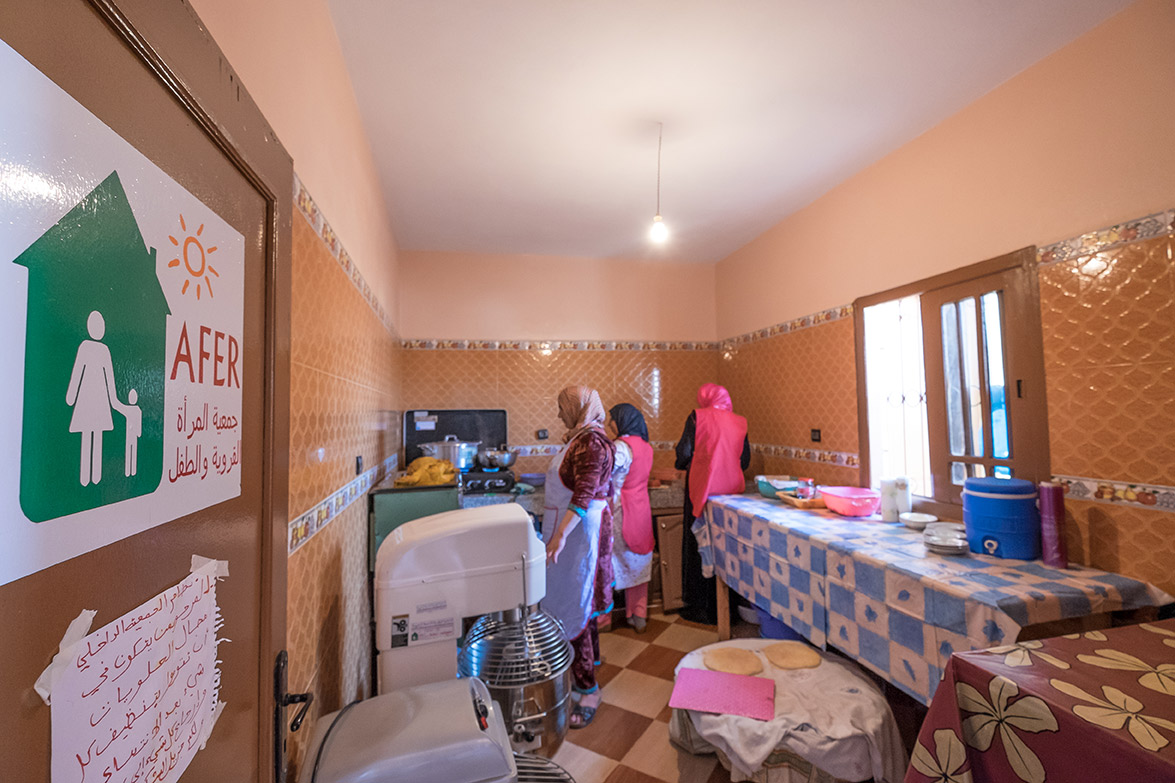Hanan Bourokba held up a large metal device that looked like a coffee maker. “It’s for extracting essences,” she explained during my recent visit to Association Des Femmes and Enfants Ruraux (Association of Rural Women and Children) or, AFER. Gesturing excitedly, she pulled a few levers, showing how the machine infused flowers in water. Bourokba and her colleagues created this small machine to help rural women produce essences from flowers. These women will sell the small vials of plant infusions in their community. It’s a practical and effective device; one of many solutions the non-profit is creating to help rural women in Morocco. Directed by Wafae El Kabbaj, AFER’s mandate is to help women and children in rural communities through education and health-care resources, as well as easy-to-implement projects that help them earn an independent income.

Members of AFER from the main office outside of Meknes.
AFER currently operates in ten locations across Morocco, covering 32 villages and working with more than 700 women. Located near the city of Meknes, the organization takes an effective approach to tackling challenges faced by local women with solutions that are both practical and easily implemented.
Education
Education is a vital tool in helping women gain independence and have the ability to make choices about their future, as well as know their rights under the law. Lack of personal income, cultural expectations, a slow economy and a lack of education lead many women in the countryside to rely completely on their husbands. Often illiterate, the women in these communities cannot qualify for jobs in the larger towns, and find that their only options are caring for the home and working in the fields. AFER’s courses aim to provide women the knowledge and skills to better their lives. For many rural women who cannot read or write, even simple tasks such as texting or dialing a phone number can be challenging. With literacy classes, they’re able to gain a sense of independence because they do not have to rely on others as much. Bourokba and El Kabbaj offer education courses on variety of subjects, including cooking and intensive literacy courses to increase reading and writing skills, given directly in the communities AFER is able to reach.

Learning skills in the kitchen leads to independence in this community.
Health care
nother area that AFER helps women is through health care. They have two ambulances and trained medical team members they can send to communities in case of emergencies. Most small-town farming communities are located a long distance from modern medical facilities. AFER fills this need in rural areas by offering health clinics, conducting cancer screenings and providing women information on their right to receive healthcare (even if they can’t afford it). For many, this is the first time they’ve had access to the resources to find good health care, as well as the first time they’ve been offered an understanding of what health care entails.
Independent income
Having an accessible, independent source of income can provide women in rural villages with the freedom to leave difficult family or relationship situations. AFER has created many practical projects women can take on to earn their own source of income. The key to these at-home jobs being successful is simplicity — the tasks do not require much technical skill or education. In addition, they are cheap to maintain and naturally fit into the women’s lives, working within the structure of their family and community obligations. At AFER, women can learn to make pastilla crusts (a type of Moroccan meat pie), which they then sell to women who work in offices. Women can also learn make flower essences, buttons and embroider saddles, among many other skills that can earn personal wages and the freedom to use this money to better their current situation.

Pastilla crusts are made here before being sold for to office workers for convenience.

Pictured here is the drum used for distilling rosewater.
Bringing men into the fold
Early on, AFER recognized the importance of educating men in the communities they work in as well. They offer education and social events for men at their main office and also have an open-door policy where men can bring any concerns or questions. In fact, many men find AFER the only place where they can get their questions answered about helping the women in their families. This inclusivity has brought AFER much support from them, which in turn makes it easier to help the women.
Relationship is king
The work AFER does isn’t just about providing information, it’s also about building relationships. They invest in the women they help — giving time, money, energy and love. The organization investigates each woman’s current situation, ascertains the most effective method of help and then goes about helping them achieve the necessary skills, courses and information to better their situation. Throughout the process (and even after women have graduated from an AFER class) the organization remains in contact. They help the women understand their rights and provide the emotional support necessary to take steps toward changing their situation. The result is a powerful impact on women’s lives in rural Morocco.

They invest in the women they help — giving time, money, energy and love.
Getting There
Let Planeterra and G Adventures introduce you to this community. A number of departures to Morocco will make a stop at the AFER centre during their trip which, in turn, will help to support their endeavours. To come and meet these wonderful ladies, check out more information here.























